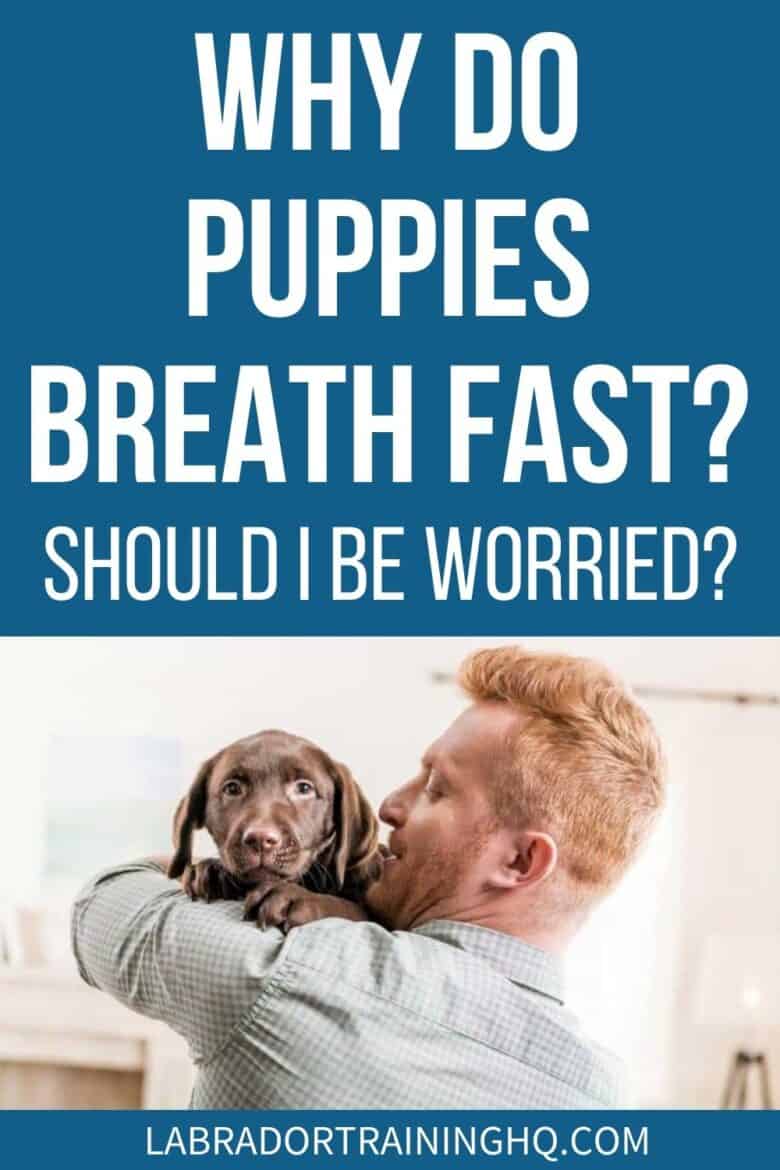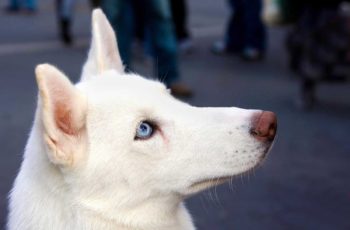This post may contain affiliate links. We may earn money or products from the companies mentioned in this post.
New pet parents who aren’t familiar with puppies will often worry when their pup is breathing very quickly, and even experienced dog owners might wonder to themselves, “Why do puppies breathe fast?”
This is normal for a puppy’s biological system, which is different from ours and causes dogs to breathe about twice as fast as humans, but what if your puppy seems to be breathing faster than normal, even for them?
This could be a natural response to a stressful situation, or it could be a sign of something more concerning. How do you know the difference?

Read on as we take an in-depth look at dog breathing, starting with what exactly is normal and why dogs breathe so much faster than humans. We’ll then look at the normal situations in which you can expect your dog’s breathing to accelerate for a brief period of time.
Finally, we’ll look at signs that your puppy’s fast breathing might be something abnormal, what might be causing it, and other signs to look out for.
Contents & Quick Navigation
How Fast Do Dogs Breathe?
Dogs do breathe faster than humans. While most humans have a respiration rate of between 12 and 20 breaths per minute when at rest, for dogs it can be almost double that. Dogs can breathe anywhere from 15 to 35 times per minute while at rest and still be considered in the normal range.
Smaller dogs tend to breathe faster than larger dogs. You can expect big dogs to be at the lower end of the spectrum and your toy and miniature breeds to be at the higher end.
It is a good idea to occasionally count your dog’s breaths for a minute when you aren’t concerned about them. This will give you a baseline for what is “normal” for your dog so that you have something to compare it to when you do have cause for concern.
During and after exercise, you will find that your dog’s breathing increases significantly, even as much as ten times. They might have a respiratory rate of between 100 and 350 breaths per minute after a game of chase, but this should last no longer than about 10 minutes once they have returned to a restful state.
Why Do Dogs Breathe So Fast?
The reason that dogs breathe so fast in comparison to humans is that this is how they manage their body heat. They can’t put on a sweater if they feel chilly or turn on a fan to fight the heat. They also can’t sweat, so breathing is the only way that they have to regulate their temperature.
Quick breathing allows air to circulate around their body and for heat to escape via their upper respiratory tract, tongue, and mouth. A little bit of quick breathing can get their body back to a comfortable temperature quickly.
What if your dog has bad breath? Read our guide here.
When Is It Normal For Dogs To Breathe Heavily?
While your dog’s resting respiratory rate should be stable at somewhere between 15 and 30 breaths per minute, there are occasions in which is it is normal for their respiratory rate to increase considerably, at least for a brief period of time.
During And After Exercise
As we have already said, it is completely normal for your dog’s respiratory rate to increase as much as ten times when they are playing, and it will remain high for a while afterward as they get their body back to a comfortable temperature.
As long as your dog’s breathing doesn’t look painful, you shouldn’t worry about very fast breathing during exercise. It should take them a maximum of about ten minutes of rest to return to normal breathing post-exercise.
If it takes longer than this, it can be a sign that they are being overexercised and you might want to tone things down on your next outing.
Puppies can’t resist a bit of fun and may push themselves too hard to keep up with you, even when they are exhausted.
In High Temperatures
When it is hot, your dog might start breathing quickly to lower its temperature. You will probably notice them doing other things to keep cool, such as finding a cool piece of ground to lay their belly on. It might be completely normal for them to have elevated breathing for several hours on a really hot day.
While your dog is doing their best to manage their temperature, they are at risk of heat exhaustion if they are kept in the heat for too long.
Think about things that you can do to help them lower their temperature. Make sure they have access to shade, a cool spot, or make a fan available for them to sit in front of, and make sure they have plenty of cool water to sip.
Active Dreams
It can be strange to see your dog breathing faster than normal when they are sleeping, but this is often nothing to worry about.
Dogs often have active dreams of chasing their favorite prey or playing with other pups. If they are getting a good workout in their sleep, their respiratory rate might rise as if they are actually doing those things.
There will usually be other signs that accompany this type of dreaming such as whining and the occasional leg twitch. Also, when they wake up, their breathing should return to normal pretty quickly.
Try not to wake them up while they are having one of those dreams. Just as it is disconcerting for you to be woken when you are in deep REM sleep, the same is true for your dog.
Stress And Anxiety
You might find that when you first bring a puppy home, they are breathing pretty fast. This can be the result of stress and anxiety associated with adapting to their new home. It is pretty normal and will pass over time.
Think about it; they have been taken away from their mother and littermates and have been plunged into an unfamiliar environment with lots of people who want to cuddle them. They are going to be stressed out! This should pass within about a week.
Other signs that your dog or puppy might be stressed out include frequent yawning, drooling, licking, pacing, shaking, a general inability to stay still, excessive shedding, and hiding away from people in the household.
While adapting to a new home is the most common cause of stress in puppies, for adult dogs being left at home alone for extended periods of time is the most common cause of stress.
Having someone drop in and pass time with your dog during the day if you are out of the house for extended periods can make a big difference to their mental health.
Read our advice on how to help your new puppy adapt to their new home here.
When To Worry About Accelerated Breathing?
If your dog seems to have extended periods of accelerated breathing for no apparent reason, you might start to be concerned. The first thing to do is to count their breathing to get a feel for just how fast their breathing is, and compare it to what is normal for them.
If you can’t identify a cause, like the heat, it is time to speak to your vet and get a diagnosis for what might be happening.
Pay particular attention to breathing issues when it comes to brachycephalic dog breeds –dogs with flat, squished faces– as breathing issues may be one of the first symptoms that they develop.
Below are the most common medical conditions associated with accelerated breathing, and the other accompanying symptoms you can expect to notice if they are affecting your dog.
Asthma
As well as rapid breathing, other common symptoms of asthma in dogs include sudden difficulty breathing, persistent coughing, heavy panting with mouth open, a bluish color to the gums, loss of appetite, and loss of energy.
Lung Cancer
Lung cancer only tends to be common in older dogs. As well as rapid breathing, other common symptoms include coughing, lethargy, vomiting, weight loss, hair loss, loss of appetite, lameness, fever, and gastrointestinal ulcers.
Kennel Cough
This is a highly contagious respiratory disease among dogs that usually gets passed around when a large number of dogs come into contact like they do in kennels. As well as rapid breathing, expect to see a strong cough, runny nose, sneezing, lethargy, loss of appetite, and low fever.
Laryngeal Paralysis
This is a disease that can make it difficult for your dog to close off their windpipe when they are eating and drinking, which can result in a variety of issues.
As well as rapid breathing you will probably notice a strange noise when they are inhaling, a change in the sound of their bark, a blue discoloration around the tongue and gums, and coughing or gagging while eating or drinking.
Windpipe Issues
Dogs can be affected by a variety of windpipe issues, including pressure on the windpipe and tracheal collapse. As well as rapid breathing, you will notice coughing, vomiting, and gagging, as well as blueness around the mouth.
Bacterial Or Fungal Respiratory Infection
As well as breathing difficulties, if your pup has picked up a respiratory infection you can expect to see snorting and sneezing, discharge around the nose and eyes, foam around the mouth, high fever, loss of appetite, weight loss, fatigue, and lethargy.
Smoke Inhalation
If your dog has been exposed to smoke which they have inhaled, in addition to rapid breathing you can expect to see coughing and wheezing, red or irritated eyes, lethargy, weakness, and foaming around the mouth.
Pain
Increased breathing can be one of the various symptoms that your dog displays when they are in some kind of pain, as a kind of stress response.
You can also expert shaking, flattening of the ears, whining, low posture, whimpering, excessive licking or scratching of a specific area, reluctance to play or move, or a loss of appetite.
Parasites
If your dog has picked up a parasite, such as heartworms, rapid breathing can be one of the symptoms. You may also see diarrhea, vomiting, scooting, a distended abdomen, weight loss, decreased activity, and a dull coat.
Compressed Lungs
A compressed lung, or pneumothorax, is an accumulation of air outside the lungs but inside the chest walls. This prevents the lungs from inflating properly.
Pressure on the lungs due to compression can cause accelerated and abnormal breathing. You may also notice a dull sound associated with their breathing, coughing, and hypoventilation.
Hernia
A hernia is when the contents of a dog’s abdomen push through a hole or a weak area in the muscle walls. It can be congenital, or the result of an accident.
When your dog is suffering from a hernia, as well as a bulge at the site of the hernia and rapid breathing you may notice vomiting, loss of appetite, drooling, and other general signs of pain.
Anemia
Anemia occurs when a dog cannot produce enough red blood cells or hemoglobin. This can affect several vital body functions. Dogs suffering from anemia often breathe quickly. They will also likely have pale gums, seem weak and lethargic, and have very dark-colored stools.
Medication
Certain medications can cause your dog to start breathing quickly. This side effect should be listed on the medication along with other symptoms to look out for.
Symptoms Of Concern
In addition to the speed, the main symptoms to be concerned about in connection with breathing are:
- Breathing with the mouth open
- Noticeably labored breathing
- Any blueness around the tongue and gums
- An unusually low or high body temperature
- Any other respiratory signs such as coughing or sneezing
- Inactivity or lethargy
- Weight loss or loss of appetite
- Any changes in their regular stool
- Any general signs of pain
FAQs
How fast should my dog be breathing?
A resting respiratory rate of between 15-35 breaths per minute is considered normal for dogs.
Smaller dogs tend to breathe faster and larger dogs slower, Your dog may breathe faster after exercise, when it is very hot, or when they are stressed, but breathing faster than this for extended periods or no apparent reason is a reason for concern.
Do puppies breathe fast when they are sleeping?
It is more usual to see puppies breathing fast when they are sleeping than adult dogs. This is because they sleep more, and also because they are processing so many more new experiences.
This means that they are more likely to have the kind of intense, active dreams that cause their bodies to respond to their dream as if they are active in real life.
You will probably notice other signs of this type of dreaming, such as whining, growling, and twitching limbs. The accelerated breathing should only last a few minutes and should stop when they wake up.
Do puppies have a fast heart rate?
Dogs nearly always have a somewhat faster heart rate than humans, with the average adult dog having a resting heart rate of 60-140 beats per minute as opposed to 60-100 beats for humans, but growing puppies’ hearts are even faster.
Newborn pups can have a heart rate of around 220 beats per minute. It will slow down as they grow, but stay high at around 160-200 beats per minute for the first six months or so of their lives.
The Verdict
When you notice that your dog is breathing a lot faster than you, this is nothing to worry about. The resting respiratory rate of your dog should be about twice as fast as yours.
When they are recovering from exercise or dealing with extreme heat, you can expect their breathing to increase significantly, by as much as ten times.
This is still nothing to worry about as long as it doesn’t last for more than a few minutes. They may also breathe faster if they are dealing with stress or anxiety, or having a very active dream.
If your dog is consistently breathing at more than 35 breaths per minute for no discernable reason, though, this can be a symptom of a variety of problems from pneumonia, to parasites, to pain. It is time to consult your vet and watch out for other symptoms of what could be going on with your dog.
Have you dealt with a dog suffering from accelerated breathing?
Share your experience with the community in the comments section below.
Save To Pinterest

Top Picks For Our Dogs
- BEST PUPPY TOY
We Like: Snuggle Puppy w/ Heart Beat & Heat Pack – Perfect for new puppies. We get all of our Service Dog pups a Snuggle Puppy. - BEST CHEW TOY
We Like: KONG Extreme – Great toy for heavy chewers like our Labrador Retrievers. - BEST DOG TREATS
We Like: Wellness Soft Puppy Bites – One of our favorite treats for training our service dog puppies. - BEST FRESH DOG FOOD
We Like: The Farmer’s Dog – A couple months ago we started feeding Raven fresh dog food and she loves it! Get 50% off your first order of The Farmer’s Dog.
For a list of all the supplies we get for our new service dog puppies check out our New Puppy Checklist on the PuppyInTraining.com blog.
Why Is My Puppy Breathing Fast? Should I Be Worried? was last modified: March 12th, 2022 by


